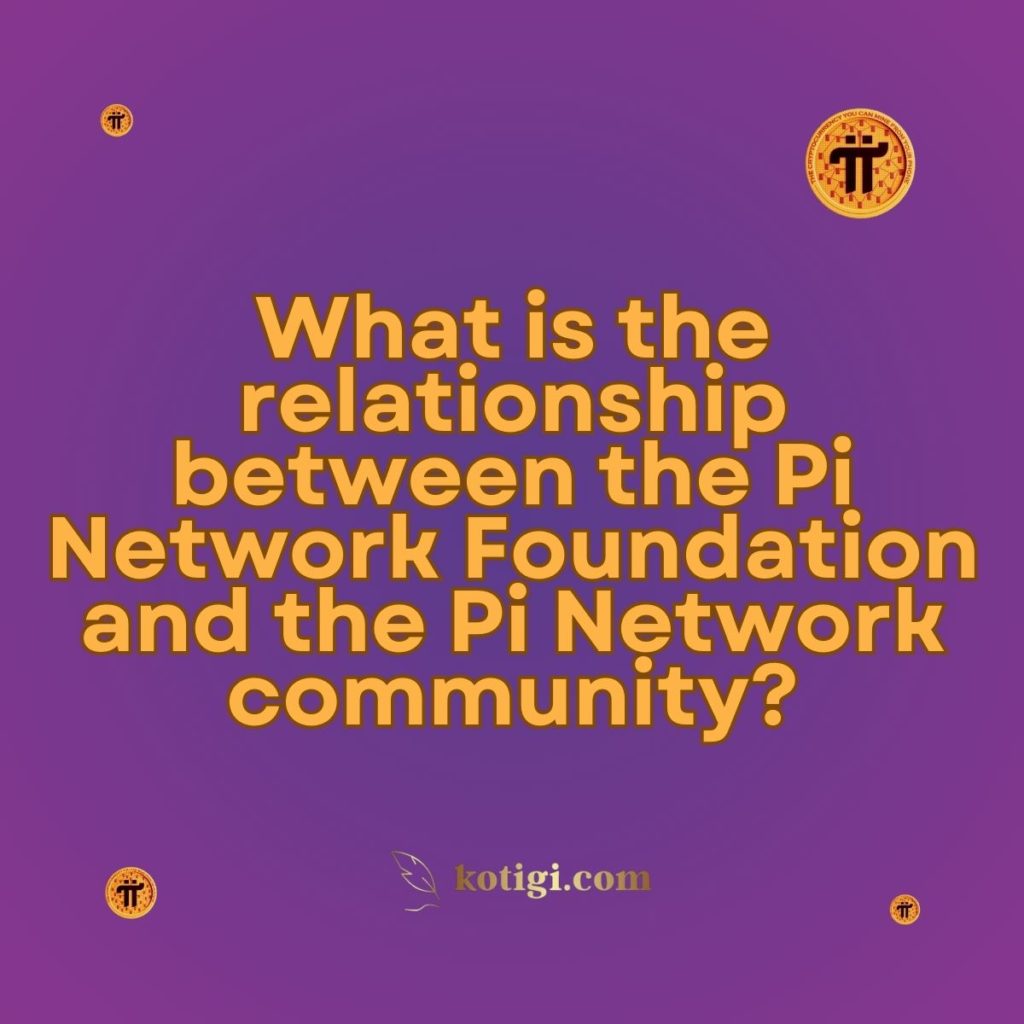
What is the relationship between the Pi Network Foundation and the Pi Network community?
The Pi Network Foundation and the Pi Network community share a symbiotic relationship, where the foundation guides technological development and strategy, while the community drives adoption, validation, and governance. This partnership ensures that both entities work together to achieve a decentralized and inclusive cryptocurrency ecosystem.
Introduction
The relationship between the Pi Network Foundation and its community is a fundamental aspect of Pi Network’s success and growth. While the foundation is responsible for the strategic vision, development, and governance of the network, the community plays an essential role in validation, engagement, and ultimately, shaping the decentralized future of Pi. Understanding the interaction between the two offers insights into how Pi Network is evolving as a truly user-centric platform.
1. The Role of the Pi Network Foundation
The Pi Network Foundation is the organizational body that spearheads the development and governance of the Pi Network. It is responsible for setting the long-term vision, technical architecture, and ensuring that the network functions securely and efficiently.
1.1 Strategic Vision and Leadership
The foundation, led by co-founders Dr. Nicolas Kokkalis and Dr. Chengdiao Fan, sets the overall strategic direction of Pi Network. Their leadership focuses on building a decentralized ecosystem that is accessible to millions globally.
1.2 Technological Development
The foundation is in charge of all technical developments, including building and maintaining Pi’s blockchain, creating security protocols, and scaling the infrastructure to support future growth.
1.3 Governance and Compliance
The foundation also oversees governance frameworks and ensures that Pi complies with global regulatory standards, creating a legal and operational framework that supports the long-term sustainability of the network.
2. Role of the Community in Pi Network
The Pi Network community is at the core of the ecosystem. Comprised of miners, validators, developers, and everyday users, the community is tasked with adopting the technology, validating transactions, and contributing to the network’s growth.
2.1 Validation of Transactions
Validators within the Pi Network community play a critical role by ensuring the security and integrity of the blockchain. These individuals verify transactions, thereby maintaining the decentralized nature of the system.
2.2 Community Governance
As Pi Network moves toward full decentralization, the community will have a larger role in governance. Decision-making processes will gradually shift from the foundation to community-based models, where users will vote on key network issues.
2.3 Community Engagement and Growth
The active participation of community members in social media discussions, events, and grassroots initiatives helps in spreading awareness and increasing the adoption of Pi Network globally.
3. Collaborative Initiatives between the Foundation and the Community
The relationship between the foundation and the community is not one-sided; it is built on collaboration. The Pi Network Foundation encourages active community participation through various initiatives that foster engagement and growth.
3.1 Hackathons and Developer Initiatives
To stimulate innovation, the foundation hosts hackathons and developer challenges, inviting community members to build applications and tools that enhance Pi’s ecosystem. These initiatives help to create a more dynamic and robust platform.
3.2 Educational Resources and Workshops
The foundation frequently organizes workshops, webinars, and releases educational materials to help the community better understand blockchain technology and how Pi operates. These resources empower users to become more active participants in the network.
3.3 Community-Driven Decision Making
The foundation has committed to incorporating community feedback into the network’s ongoing development. Whether through social media polls, surveys, or open forums, the community has the opportunity to shape the future of Pi.
4. Empowering the Community for Decentralization
One of the main goals of Pi Network is to transition to a fully decentralized model, where the community takes on a larger role in governance and decision-making.
4.1 Decentralized Governance
As Pi Network scales, the foundation plans to hand over governance to the community through decentralized voting systems, allowing users to vote on important issues like network upgrades and policies.
4.2 Role of Validators in Decentralization
Validators, who are trusted members of the community, will have increasing authority in the decision-making process, ensuring that the network remains secure and community-driven.
4.3 Growing Influence of Pi Network Users
As Pi’s user base grows, individual users will have a greater influence on the future direction of the network. Through democratic processes, the community will be able to steer the platform toward long-term sustainability and relevance.
5. Challenges in Foundation-Community Relations
While the relationship between the Pi Network Foundation and its community is largely collaborative, there are challenges that need to be addressed to ensure long-term success.
5.1 Managing Expectations
One of the primary challenges the foundation faces is managing community expectations regarding the timeline for decentralization, network upgrades, and listing on major exchanges. Transparency is key to maintaining trust.
5.2 Balancing Control and Decentralization
Another challenge is finding the right balance between maintaining the necessary level of control to ensure the network’s success and transitioning to full decentralization, where the community holds the reins.
5.3 Ensuring Security in a Decentralized System
As more decision-making power is handed over to the community, ensuring that the system remains secure and resistant to attacks is a top priority. The foundation must create a governance model that is both inclusive and robust.
6. The Future of Pi Network’s Foundation and Community Collaboration
Looking forward, the Pi Network Foundation is committed to further enhancing its collaboration with the community, aiming for a decentralized, inclusive, and globally impactful cryptocurrency ecosystem.
6.1 Building a Stronger Community Voice
The foundation continues to seek ways to give the community a more prominent voice in network decisions. This includes expanding governance tools, allowing for broader community participation in the direction of Pi Network.
6.2 Expanding Educational Opportunities
As Pi grows, the foundation plans to increase its educational offerings, ensuring that community members have access to resources that can help them contribute more effectively to the network.
6.3 Strengthening Validator Involvement
With an increasing role for validators in ensuring the security and success of the platform, the foundation will focus on strengthening this role and encouraging more users to become validators.
Conclusion
The relationship between the Pi Network Foundation and its community is a unique partnership that serves as the backbone of the network. While the foundation provides the strategic vision and technical development, the community drives adoption and decentralization. This collaborative approach ensures that Pi Network remains user-focused while steadily progressing toward a fully decentralized and scalable ecosystem. As the network grows, the interaction between the foundation and the community will continue to evolve, creating new opportunities for innovation and global adoption.
Key Takeaways
- Foundation’s Leadership: The Pi Network Foundation provides strategic vision and technological development while guiding the network toward decentralization.
- Community Participation: The community plays a vital role in validation, governance, and adoption of Pi Network.
- Collaborative Initiatives: Hackathons, educational workshops, and community-driven decision-making efforts foster collaboration between the foundation and the community.
- Decentralization Goals: The foundation plans to transition to a fully decentralized system, where the community will take on greater decision-making responsibilities.
- Challenges: Managing community expectations, balancing decentralization with control, and ensuring security remain key challenges for the network.
- Future Vision: The future of Pi Network involves deeper community involvement, more educational resources, and expanded roles for validators in governance.





